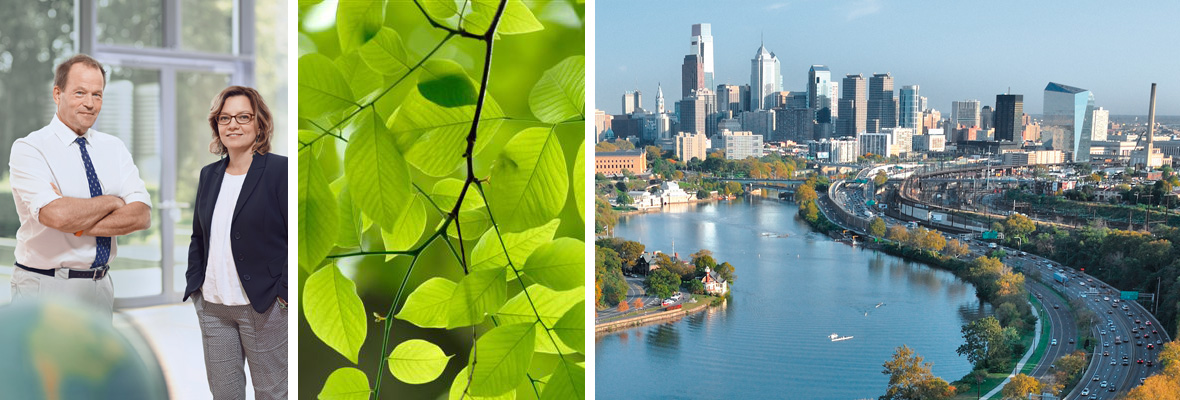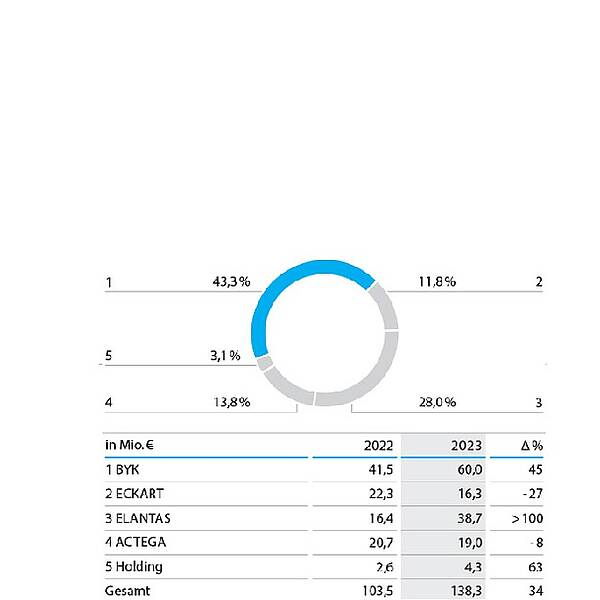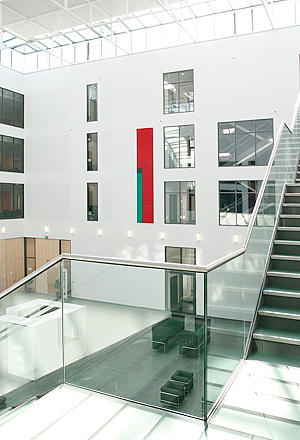ALTANA’s Understanding of Sustainability
ALTANA is consistently focused on sustainable, profitable growth. We can only be economically successful in the long run if we also keep ecological and social aspects in mind. They are therefore firmly anchored in our understanding of sustainability and our corporate culture.
Economy, ecology, and social responsibility: ALTANA’s understanding of sustainability is based on this triad. This is also reflected in ALTANA’s mission:
- We provide innovative solutions based on integrated chemical, formulation, and application expertise that make products of daily life better and more sustainable.
- Our solutions open up growth or savings potential for our customers and can change entire markets.
- As a result, we create value for our customers, employees, owner, and society as a whole.
However, we have not only been making our customers’ products more sustainable for decades, but have also reduced our own greenhouse gas emissions.
For further details on our measures, please visit the "Consistent climate strategy" page.
Go directly to the main topics:
ALTANA's understanding of sustainability has shaped the company for decades
ALTANA’s understanding of sustainability has shaped the company for decades
ALTANA has been a member of the UN Global Compact since 2010, pledging to incorporate its ten principles into the company's operations and uphold the overarching goals of the United Nations. You can access our latest Communication on Progress regarding the Global Compact Principles in the Corporate Report 2024.
In addition, ALTANA supports the "2030 Agenda for Sustainable Development," which was adopted by the 193 member states of the United Nations at the summit on September 25, 2015. This commitment underscores our firm belief that we can only achieve our sustainability goals together. And everyone has to make a contribution. What else is needed? Ambitious yet realistic targets. A good example are the climate protection targets drawn up by 195 countries at the 2015 UN Climate Change Conference in Paris (COP21). After days of talks, the nations agreed on an action plan on December 12. The goal: to limit global warming to well below 2 °C. A lot has happened since then, but more still needs to be done to counteract dangerous climate change.
ALTANA has committed to operating virtually greenhouse gas-free worldwide by 2050 and achieving “net zero emissions”. Specifically, emissions are to be reduced by 90 percent across the entire value chain (Scope 1, 2 and 3) by then.
Progress is already underway: between 2014 and 2023, ALTANA successfully reduced greenhouse gas emissions in Scopes 1 and 2 by approximately 70 percent – without relying on offsetting.
ALTANA’s corporate goals for environmental and climate protection have been included in the calculation of the variable income of top management since 2007. Since we can only achieve our objectives together, we work closely with our stakeholders, which also shapes our understanding of sustainability.
The view of our stakeholders
As a globally manufacturing specialty chemicals company, ALTANA has various stakeholders with whom the Group and the individual divisions are in regular contact and exchange. The content and results of these dialogs are among the factors that shape ALTANA’s understanding of sustainability. ALTANA’s most important stakeholders are its customers, employees, and owner, as well as suppliers and other business partners, authorities, associations, non-governmental organizations (NGOs), and our neighbors at the various sites.
ALTANA has published the current status of the materiality matrix in its corporate report.
Objective evaluation of sustainability
In order to make not only its economic performance but also the company's commitment in all areas of sustainability measurable, ALTANA is increasingly using external assessments in addition to key figures and certified management systems. The EcoVadis assessment system and membership in the Together for Sustainability (TfS) initiative are particularly significant in this regard.
EcoVadis
EcoVadis has become the leading assessment platform for the chemical industry. Tens of thousands of companies now work with EcoVadis. For the assessment, the rating company analyzes four topics – environment, labor and human rights, ethics, and sustainable procurement. The investigations are based on leading standards (GRI, UN Global Compact, and ISO 26000).
ALTANA uses the objective EcoVadis rating of its production sites and ALTANA AG as a whole to make the respective status quo transparent both internally and externally, as well as to systematically drive sustainability forward within the company.
Together for Sustainability (TfS)
TfS is an industry-led initiative based on a global network of leading chemical companies that aims to raise the level of sustainable standards in the supply chain. As a member of this initiative, ALTANA focuses on transparency, efficiency, and strict, uniform sustainability standards in the supply chain. Through regular assessments and audits, ALTANA also gains valuable insights into suppliers' sustainability practices and can continuously improve them together with the suppliers.
In this way, ALTANA ensures that its own products meet the highest ecological and social standards – and enables customers to achieve their own sustainability goals. By closely collaborating with other chemical companies and sharing knowledge and resources with them, ALTANA can actively shape the future of the chemical industry. This collaborative approach drives sustainable innovation and ensures a lasting positive impact.
Organization of sustainability
The ALTANA Group’s operating companies are responsible for implementing and anchoring sustainability. The individual companies are committed to continually reducing the environmental effects of the Group and to improving safety at the respective sites. In addition, the individual sites are required to introduce suitable management systems and have them certified. Furthermore, special cross-divisional expert platforms are used to exchange information on relevant EH&S topics (for example energy, sustainability performance, and environmental indicators) and to highlight best-practice models.
Contact
Corporate Communications
press@altana.com
Tel +49 281 670-10900
Environment, Health & Safety
Dr. Michael Berkei
Head of Environment, Health and Safety
Michael.Berkei@altana.com



